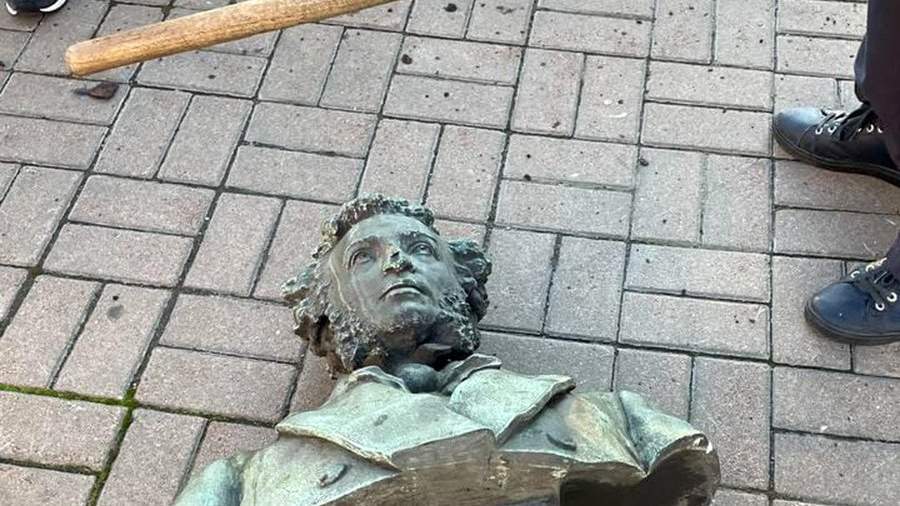dea, trama y
estiloSin estos tres
componentes, no hay obra de ficción.
Literatura /
Literatura / Invitación al diálogo
Ermakova
Anastasia

Anna Matveeva
Fotografía: Juris
Žigulis
"Ni el declive ni
el florecimiento se observan en la literatura moderna", dice Anna
Matveeva.
- La novela "Cada
cien años", publicada este año por la "Edición de Elena
Shubina", fue incluida en la lista de finalistas del Premio Yasnaya
Polyana, pero, desafortunadamente, no se convirtió en laureada. Y aunque todos
entendemos que cualquier premio es una especie de lotería, probablemente siga
siendo muy decepcionante...
- Creo que todos los
finalistas preferirían salir de la ceremonia no solo con un diploma, sino
también con un premio, pero no hay nada que puedas hacer al respecto. Sin
suerte con la prima, ¡suerte en el amor! Además, el actual laureado de
"Yasnaya Polyana", Dmitry Danilov, es tan bueno y talentoso que no
era tan ofensivo para él perder como para otra persona. Por delante de mí tengo
otra carrera premium: en diciembre presentarán el "Libro Grande", la
novela también está incluida en la lista de finalistas. Ver.
– ¿Cómo evalúa el
proceso premium moderno? ¿Qué tan importante es para los escritores participar
en ella?
- Casi todos los años
trabajo en el jurado de premios literarios (el año pasado hubo tres de ellos,
este año, dos: "¡Clase!" y el Premio Arsenyev) y puedo decir que esta
es una prueba difícil. Y participar en los premios es doloroso, cuando su
creación es discutida y condenada, a menudo sin leer, y juzgar el trabajo de
los colegas también es muy difícil. ¿Quién soy yo para evaluarlos? Me gusta el
enfoque del premio "¡Clase!", cuando los miembros del jurado reciben
textos bajo los números, sin una firma. Lees y evalúas el texto en sí, sin
tener en cuenta la personalidad del autor; hay algo muy correcto en esto, pero
dudo que esta experiencia pueda aplicarse a los premios "adultos". En
cuanto a mí como participante, durante unos seis años no nominé (y le pedí al
editor que no lo hiciera) mis libros para el "Libro Grande" y otros
premios importantes. Me gustó mucho esta no participación: cuando no tienes que
estar nervioso, no tienes que esperar nada, no tienes que leer las
"críticas" que tienes que poner de rodillas en cinco minutos, no
tienes que sentarte en el escenario con una "cara cambiada". Y luego
apareció la novela "Cada cien años", que me aconsejaron que
presentara para el premio, y salí de mi escondite. Estoy deseando volver allí.
Creo que la participación en los premios es útil para todos los escritores,
pero solo si tienen un sistema nervioso estable y una autoestima normal. E
incluso el premio más alto no reemplazará el amor del lector: inmediatamente
después de "Yasnaya Polyana", una mujer extraña se me acercó y me
dijo tantas palabras buenas e inteligentes sobre mi libro que inmediatamente
olvidé mi fracaso.
Has estado trabajando en
la novela Cada cien años durante casi una década, que en el mundo de hoy con
sus ritmos locos parece casi increíble. ¿Por qué el trabajo tomó tanto tiempo?
¿Cuál fue la parte más difícil?
- Inmediatamente entendí
que sería una construcción a largo plazo, así que no tenía prisa. Paralelamente
a la novela, trabajó en otros libros: a lo largo de los años se publicaron la
novela "El sentimiento envidiable de Vera Stenina", colecciones de
cuentos y ensayos. Probablemente aparecieron seis libros. Me pareció muy
importante visitar todos los lugares donde se desarrolla la novela, desde
Poltava, Lovitch y Lausana hasta San Petersburgo, Vitebsk, Khabarovsk. Y no
solo "visitar", sino pasar algún tiempo allí. En Lausana, San
Petersburgo y Ekaterimburgo, también trabajé en archivos históricos,
bibliotecas... Muchas cosas tenían que ser leídas, dominadas, realizadas. E
incluso ahora, después de un tiempo, todavía no creo que este trabajo esté
terminado. Y lo más difícil fue decidir escribir una novela así. Cuando se toma
la decisión, todo se vuelve más fácil.
- El libro está basado
en el diario de tu abuela. Una de sus historias más famosas, "Dyatlov
Pass...", también se basó en los documentos. ¿Cómo trabajas con el
material documental? ¿Cómo elegir lo que es importante y significativo para una
obra de arte, para separar el trigo de la paja? ¿Qué tan objetivo puede ser un
escritor cuando trabaja con hechos?
- Trabajo en
"Dyatlov Pass..." Fue construido de manera diferente: manejé los
documentos con mucho cuidado y los transferí al texto, preservando incluso
errores obvios, errores tipográficos cometidos por la secretaria o el operador
telefónico. Quería que el lector tuviera exactamente lo mismo frente a sus ojos
que el autor. En el caso de cada cien años, es muy diferente. Los diarios de mi
abuela, Ksenia Mikhailovna Lyovshina, realmente formaron la base de una de las
líneas de la novela, pero cambié algo en ellos, acorté y, en algunos lugares,
por el contrario, lo agregué, ya que no se han conservado todos los diarios.
Pero los fragmentos completos no son mi fantasía, sino los hechos de la
biografía de Ksenia Mikhailovna. Cada escritor determina por sí mismo cómo
trabajar con documentos. Bueno, la objetividad surge naturalmente de los
hechos, porque discutir con documentos es una ocupación bastante sin sentido,
aunque a su manera fascinante.
- La colección de
"historias reales" sobre musas y modelos de grandes artistas
"Picture Girls" destaca entre sus libros. ¿Cómo llegaste a un tema
tan inusual? ¿Hay otras colecciones similares planeadas sobre el destino de
mujeres reales que han influido en la cultura?
- "Picture
Girls" nació porque no pude encontrar un libro así en ninguna parte, sobre
modelos de grandes maestros. Ahora estoy trabajando en la segunda parte de
"Picture Girls" y cada mes leo un capítulo de un nuevo libro en la
galería de Ekaterimburgo "Main Avenue".
- Su equipaje creativo
tiene aproximadamente la misma cantidad de prosa grande y pequeña. A menudo,
los escritores todavía gravitan hacia una cosa ... ¿Crees que tu respiración en
prosa es larga o corta?
– Conozco diferentes
técnicas de respiración. En serio, me gusta escribir más historias, pero
entiendo que los lectores (y mi editora Elena Shubina) esperan novelas de mí,
así que en unos años, tal vez, volveré a una forma grande.
- Algunos críticos
clasifican tus obras como "prosa de mujeres". ¿Cómo te sientes acerca
de este concepto? ¿Crees que existe tal división? Y si es así, ¿en qué se
diferencia la "prosa de las mujeres" de la "masculina"?
- No me tomo en serio
las valoraciones de tales "críticos", aunque me sorprende que incluso
hoy alguien utilice seriamente una definición tan sin duda ridícula como
"prosa de mujeres".
– ¿Cómo definirías el género
y la dirección en la que trabajas?
- Nunca lo he pensado,
no me interesa nada. Los críticos, críticos literarios, críticos literarios,
lectores deben reflexionar sobre el género y la dirección en la que trabaja el
escritor, pero el autor es lo último que debe hacer.
– Si hablamos del
componente semántico de cualquier obra, ¿qué es lo más importante para ti, sin
el cual una novela o una historia en principio no puede tener lugar?
- Para una obra
literaria - estamos hablando de prosa ahora, por supuesto - tres componentes
son importantes, creo - la idea (pensamiento), la trama (historia) y el estilo.
Si hay al menos uno, ya es bueno. En la literatura moderna, me parece, hay un
déficit de pensamiento: escribir bellamente no es una cuestión, también puedes aprender
a contar historias, en general, pero también puedes aprender a alcanzar el
nivel de una gran idea, formular un pensamiento original; esto, me temo, no se
enseña, tienes que nacer con esto. Y eso es lo que falta en este momento.
- Hoy en día se habla
mucho sobre el bajo nivel de la prosa moderna, sobre el hecho de que incluso
los mejores ejemplos de ella todavía "se quedan cortos" de los
clásicos. ¿Crees que ese es el caso? ¿Qué tan apropiado y necesario es comparar
la prosa moderna con los clásicos?
- Es bastante difícil
saber que hay un genio viviendo a tu lado. Hubo excepciones en la historia, por
supuesto: Pushkin, Leo Tolstoy, pero estas son las excepciones. No serán los
contemporáneos quienes decidirán lo que se convertirá en clásicos, sino los
descendientes. Nadie puede predecir qué nombres permanecerán en la historia de
la literatura y cuáles se disolverán sin dejar rastro: hay muchos ejemplos en
los que el nombre de un escritor o artista que tronó durante su vida fue
completamente olvidado después de unas décadas, y viceversa. Pensar seriamente
en esto hoy es ridículo. Y comparar la prosa moderna con los clásicos es una
tontería, estos son, me temo, fenómenos de diferente orden. Vivimos en un mundo
que cambia cada segundo, y la literatura no puede resistir con una roca
inquebrantable. Personalmente, sin embargo, lo siento.
– ¿En qué etapa de
desarrollo se encuentra, en su opinión, la literatura doméstica actual? ¿Hay
una sensación de declive o, por el contrario, de ascenso?
- Si bien todo es como
de costumbre: los maestros reconocidos escriben un año basado en la novela,
aparecen nuevos nombres, en general, el proceso como un proceso. No noto ni
declive ni florecimiento, pero en general, es difícil para una persona que está
dentro del proceso hablar de ello. Desde el exterior, probablemente más
visible.
La conversación fue conducida
por
Anastasia Ermakova
Dossier "LG"
Anna Alexandrovna Matveeva es una escritora de prosa, periodista,
editora. Nacido en Sverdlovsk, graduado de la Facultad de Periodismo de la
Universidad de los Urales. Autor de las
novelas "Dyatlov Pass, or the Mystery of the Nine", "The
Enenvidiable Feeling of Vera Stenina", colecciones de cuentos "Nine
Nineties", "Katya Goes to Sochi", etc. Vive y trabaja en Ekaterimburgo y Moscú.






